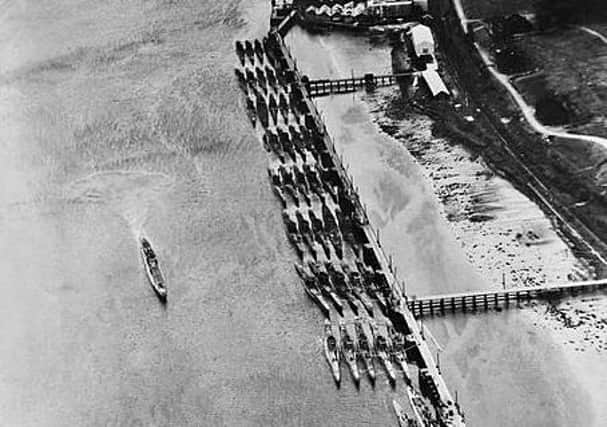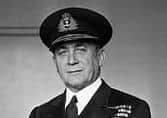Londonderry was key to victory in longest-running campaign of WWII


The Battle of the Atlantic was the longest running campaign of the Second World War.
It began with the sinking of the Athenia, a transatlantic passenger liner, on September 3 1939 within hours of the British declaration of war, and only ended with the defeat of Germany in May 1945.
Advertisement
Hide AdAdvertisement
Hide AdChurchill claimed: ‘The only thing that ever really frightened me during the war was the U-boat peril.’ It caused him even greater anxiety than the Battle of Britain in 1940.


The UK’s heavy dependence on imported food stuffs and raw materials made the nation extremely vulnerable.
Survival came at great cost. Between 1939 and 1945, 3,500 Allied merchant ships (totalling 14.5 million tons) and 175 Allied warships were sunk and 72,200 Allied naval and merchant seamen lost their lives. The Germans lost 783 U-boats and approximately 30,000 sailors killed.
Historians differ as to how close the UK came to disaster. For example, there is tendency to focus on the fact that over 720,000 tons of Allied shipping were lost between July and December 1941 but to disregard the fact that 1.6 million tons were saved or to note that in March 1941 U-boats sunk 41 ships and to overlook the fact that three of Germany’s ablest and most dangerous U-boat captains were ‘neutralised’.
Advertisement
Hide AdAdvertisement
Hide AdAdmiral Dönitz, the creator and commander of Germany’s U-boat fleet, contended that he needed 300 U-boats to deliver Hitler victory. He started the Second World War with only 43 U-boats but ended it with 463. It is just as well that Dönitz did not start the war with the latter number. Mercifully, Hitler had little grasp of naval strategy and only recognised the full potential of U-boats to deliver him victory comparatively late in the day.
Although Dönitz succeeded Hitler as German Head of State in 1945, fortunately he was not a particularly influential figure in 1939.
Nicholas Monsarrat, a member of the RNVR who commanded a frigate during the Battle of the Atlantic, captures the flavour of the conflict in his novel ‘The Cruel Sea’ in a manner never likely to be surpassed.
Monsarrat was unstinting in his admiration for the Merchant Navy and especially the crew of oil tankers: ‘They lived … as a man living on the top of a keg of gunpowder: the stuff carried – the lifeblood of the whole war – was the most treacherous cargo of all; a single torpedo, a single small bomb, even a stray shot from a machine gun, could transfer their ship into a torch.’
Advertisement
Hide AdAdvertisement
Hide AdMonsarrat viewed Éire’s neutrality with well merited contempt: ‘In the list of people you were prepared to like when the war was over, the man who stood by and watched while you were getting your throat cut could not figure very high.’
Irish neutrality and its impact on the Battle of the Atlantic was the subject of one of Louis MacNeice’s war poems:
The neutral island facing the Atlantic,
The neutral island in the heart of man,
Are bitterly soft reminders of the beginnings before the end began.
Look into your heart, you will find a County Sligo, bevel hill with for navel a cairn of stones,
You will find the shadow and sheen of a moleskin mountain
And a litter of chronicles and bones.
Look into your heart, you will find fermenting rivers,
Intricacies of gloom and glint,
Advertisement
Hide AdAdvertisement
Hide AdYou will find such ducats of dream and great doubloons of ceremony
As nobody to-day would mint.
But then look eastwards from your heart, there bulks
A continent, close, dark, as archetypal sin,
While to the west off your own shores the mackerel are fat with the flesh of your kin.
The most critical period in the Battle of the Atlantic was 1942-3. Losses to U-boats reached their monthly peak in November 1942. Thereafter, despite the occasional monthly blip, the loss of Allied merchant shipping steadily declined. This fact is all the more remarkable because by 1943 the Germans had four times as many U-boats as they had at the beginning of the war.
On May 9 1943, when the services of J M Andrews, Northern Ireland’s second prime minister, were recognised by his being made a Companion of Honour, Churchill acknowledged the contribution of Northern Ireland in keeping open the Atlantic lifeline.
Advertisement
Hide AdAdvertisement
Hide AdWith neutral Éire’s refusal to grant the UK access to the recently handed-over Treaty ports, Northern Ireland was the most westerly part of the United Kingdom from which air sorties and convoy escorts could be mounted.
Catalina and Sunderland flying boats operating from Castle Archdale in Co Fermanagh made an important contribution to closing ‘the ocean gap’ in waging the Battle of the Atlantic.
Large numbers of American, British and Canadian ships based at Lisahally, near Londonderry, played a vital role in defeating the U-boat peril. In February 1942 there were more than 80 naval escort vessels moored in the Foyle. By the spring of 1943 Londonderry was the base for 140 Royal Navy and American warships and 19,000 service personnel.
As the official war historian J W Blake in ‘Northern Ireland in the Second World War’ (1956) explained: ‘Londonderry held the key to victory in the Atlantic. It became our most westerly base for the repair, the working up and refuelling of destroyers, corvettes and frigates. By that critical spring [1943] when battle for the security of our Atlantic lifelines finally turned our way, Londonderry was the most important escort base in the north-western approaches.’
Advertisement
Hide AdAdvertisement
Hide AdWhen the official surrender of the German U-boat fleet took place on May 15 1945, the Commander-in-Chief of Western Approaches, Admiral Max Horton, insisted that it took place at Lisahally in recognition of its pivotal significance during the Battle of the Atlantic.
The architects of the Plantation of Ulster in the early 17th century had an appreciation of Londonderry’s strategic location but they could not have begun to imagine its immense strategic significance three centuries later in the Second World War.